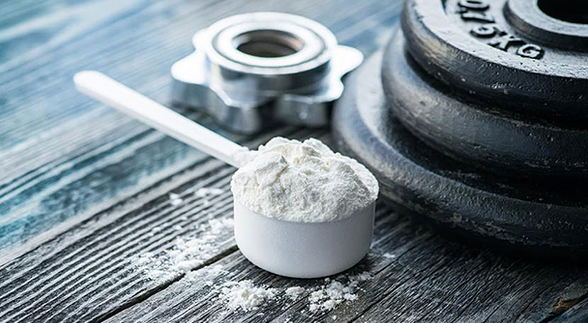The Unseen Power of Creatine: Fueling More Than Just Muscle

The Quiet Achiever in Your Shaker Bottle
It sits quietly in countless gym bags, a white powder often relegated to the realm of bulging biceps and record-breaking lifts. This is creatine monohydrate, a supplement so ubiquitous in the fitness world that it’s almost taken for granted. For decades, it’s been the trusted ally of workout enthusiasts, delivering tangible results in strength and muscle growth. But beneath this well-established reputation lies a more profound story, one that extends far beyond the weight rack. Groundbreaking research is now illuminating creatine's remarkable impact on cognitive function, mental well-being, and its potential to become a vital nutrient in the broader landscape of public health. Prepare to have your perception of this unassuming supplement transformed as we journey from its historical roots and celebrated muscular benefits to the cutting-edge science of brainpower and the intriguing possibility of creatine gracing our everyday foods.
The Underdog Story: A Brief History of Creatine
Our story begins in 1832, not in a gym, but in a French laboratory. Chemist Michel Eugène Chevreul first identified creatine in meat, unknowingly laying the foundation for a supplement that would revolutionize athletic performance. For over a century, creatine remained a scientific curiosity. Then, in the 1970s, whispers emerged of its use by Soviet athletes, hinting at a performance-enhancing secret that contributed to their dominance in various sports.
The world took notice in the 1992 Barcelona Olympics. Athletes like British sprinter Linford Christie and hurdler Sally Gunnell openly credited creatine for their medal-winning performances. This marked creatine’s explosive entry into the mainstream. No longer confined to elite athletes, it rapidly became a staple for anyone serious about fitness. Its appeal was simple: it worked, and a growing body of research consistently affirmed its safety profile, solidifying its place as a cornerstone of the supplement industry.
The Bedrock of Strength: Why Every Fitness Enthusiast Swears by It

The reason behind creatine’s enduring popularity in the gym is rooted in fundamental cellular biology. Our muscles rely on a molecule called adenosine triphosphate (ATP) for energy, especially during short bursts of high-intensity activity. Think of ATP as the cellular currency of energy. During intense exercise, ATP is rapidly depleted. This is where creatine phosphate steps in, acting like a cellular battery recharger. It donates a phosphate group to ADP (adenosine diphosphate), quickly regenerating it back into ATP, allowing you to push harder for longer.
As Dr. Richard Kreider, a leading researcher in exercise science and creatine explains: "Creatine is one of the most effective nutritional supplements available to athletes in terms of increasing high-intensity exercise capacity and lean body mass during training."
This translates to tangible benefits in the gym: increased strength and power output, enabling you to lift heavier weights and perform more repetitions. But creatine’s impact on muscle growth extends beyond just energy. It’s been shown to play a role in cell signaling pathways that promote muscle protein synthesis, the process of building new muscle tissue. While some initial weight gain might be due to increased water retention within muscle cells (a sign that creatine is being taken up), the long-term effect is genuine muscle hypertrophy. Furthermore, creatine can help reduce muscle cell damage and inflammation following intense exercise, leading to faster recovery times, allowing you to get back to training sooner.
Scientific substantiation has been confirming this for decades. Dr. Layne Norton, a renowned expert in strength training and nutrition: Often emphasizes in his podcasts and interviews that creatine is one of the few supplements with an overwhelming amount of scientific evidence supporting its efficacy and safety for enhancing athletic performance.
The New Frontier: Creatine and the Brain

The narrative around creatine is undergoing a fascinating evolution. Scientists are increasingly recognizing the brain as another highly energy-demanding organ, one that relies heavily on efficient ATP production for optimal function. Just like our muscles, brain cells utilize creatine to buffer and regenerate ATP. This realization has opened up exciting new avenues of research exploring creatine’s impact on cognitive abilities and mental well-being.
Emerging evidence suggests that creatine supplementation can significantly benefit various aspects of cognitive function. Studies have shown improvements in short-term memory and processing speed, particularly in situations that place a high demand on the brain, such as sleep deprivation or mentally taxing tasks. Intriguingly, research indicates that individuals with naturally lower creatine levels, such as vegetarians and the elderly, may experience even more pronounced cognitive benefits from supplementation. Furthermore, there's growing interest in creatine's potential as a neuroprotective agent, helping to shield brain cells from damage associated with certain neurological conditions.
Dr. Andrew Huberman, a neuroscientist at Stanford University isn't the only one convinced: "For individuals who are vegetarian or vegan, creatine supplementation can be particularly beneficial for cognitive function because they're not getting it from their diet. The data on this is quite clear." In numerous podcast episodes, he has also discussed the potential need for slightly higher doses (e.g., 5-10 grams) to effectively saturate the brain with creatine.
Perhaps one of the most compelling areas of research involves creatine's impact on mental health and mood. Early studies suggest that creatine may be a valuable adjunct therapy for depression. The proposed mechanism involves helping to restore energy balance in the brain, which can be disrupted in individuals with mood disorders. While more research is needed, these initial findings paint a promising picture of creatine’s potential to support mental well-being.
Here's what Dr. Peter Attia, a physician focusing on longevity and preventative medicine: "The brain is an incredibly energy-demanding organ. Providing it with an efficient fuel source like creatine has implications for everything from cognitive performance to mood regulation. The research in this area is incredibly exciting." He has often highlighted the favorable risk-to-benefit profile of creatine in the context of overall health optimization.
The Future of Food: Creatine on Your Dinner Plate?

Imagine a future where the benefits of creatine are accessible to a wider population, integrated seamlessly into our daily diets. This isn't as far-fetched as it might sound. We have a history of fortifying foods with essential nutrients to address public health needs. Consider the addition of iodine to salt to prevent goiter or vitamin D to milk to combat rickets.
From a public health perspective, creatine could be considered a "conditionally essential" nutrient for certain groups. Vegetarians and vegans, whose diets lack the primary dietary sources of creatine (meat and fish), often have lower baseline levels. Similarly, the elderly population, who may consume less protein and experience a decline in natural creatine synthesis, could significantly benefit from increased creatine intake to support both muscle mass and cognitive function as they age.
The feasibility of food fortification is a key consideration. Creatine monohydrate is relatively stable and generally tasteless, making it a potential candidate for addition to various food products like plant-based milks, yogurts, and protein bars. While regulatory hurdles and consumer perception would need to be addressed, the potential to improve public health through widespread creatine availability is a compelling prospect. Could we one day see public health recommendations for daily creatine intake, similar to other vital nutrients? The growing scientific evidence certainly warrants the conversation.
Practical Application and Dispelling Myths
Incorporating creatine into your routine is straightforward. The generally recommended daily dose of creatine monohydrate is 3-5 grams. While a "loading phase" (taking a higher dose for a short period) can saturate your muscles faster, it’s not strictly necessary to experience the benefits; consistent daily intake will achieve the same result over time.
Let’s address some persistent misconceptions. The notion that creatine simply causes water weight gain is misleading. While it does increase water content within muscle cells, this is part of its mechanism of action and contributes to cell volumization, which can stimulate muscle growth. It’s not the same as subcutaneous bloating.
Two other common myths, linking creatine to kidney damage and hair loss, have been repeatedly debunked by extensive scientific research. In healthy individuals, creatine supplementation at recommended doses has not been shown to negatively impact kidney function or cause hair loss. When choosing a supplement, stick with the tried-and-true "creatine monohydrate." More expensive, novel forms haven't consistently demonstrated superior efficacy.
Conclusion: The Power You're Probably Missing

Creatine monohydrate is far more than just a muscle-building supplement. It’s a safe, affordable, and remarkably versatile compound with profound implications for both physical and cognitive health. The decades of research supporting its benefits for athletic performance are now being complemented by exciting new discoveries highlighting its potential to enhance brain function, support mental well-being, and potentially play a crucial role in promoting healthy aging.
It's time to look beyond the outdated stereotypes and recognize creatine for what it truly is: a fundamental component that can enhance our overall health and vitality, regardless of our fitness aspirations. As the science continues to evolve, creatine is poised to move from the shaker bottle to a more prominent place in our understanding of optimal nutrition, potentially even finding its way into the foods we consume daily. The quiet achiever in your shaker bottle might just be one of the most powerful and underappreciated nutrients of our time.




